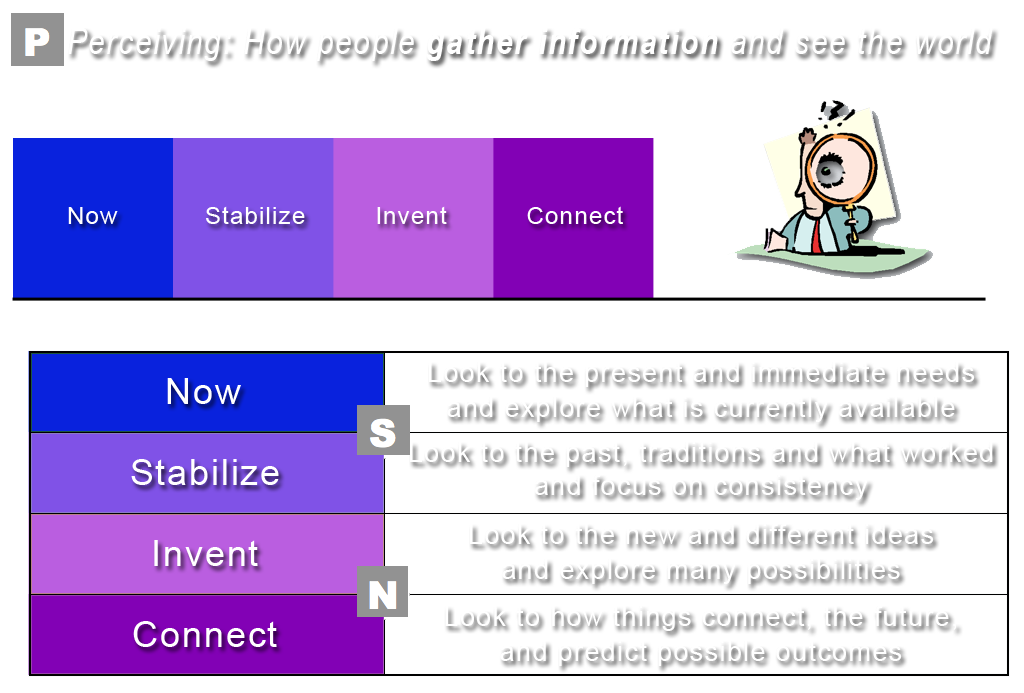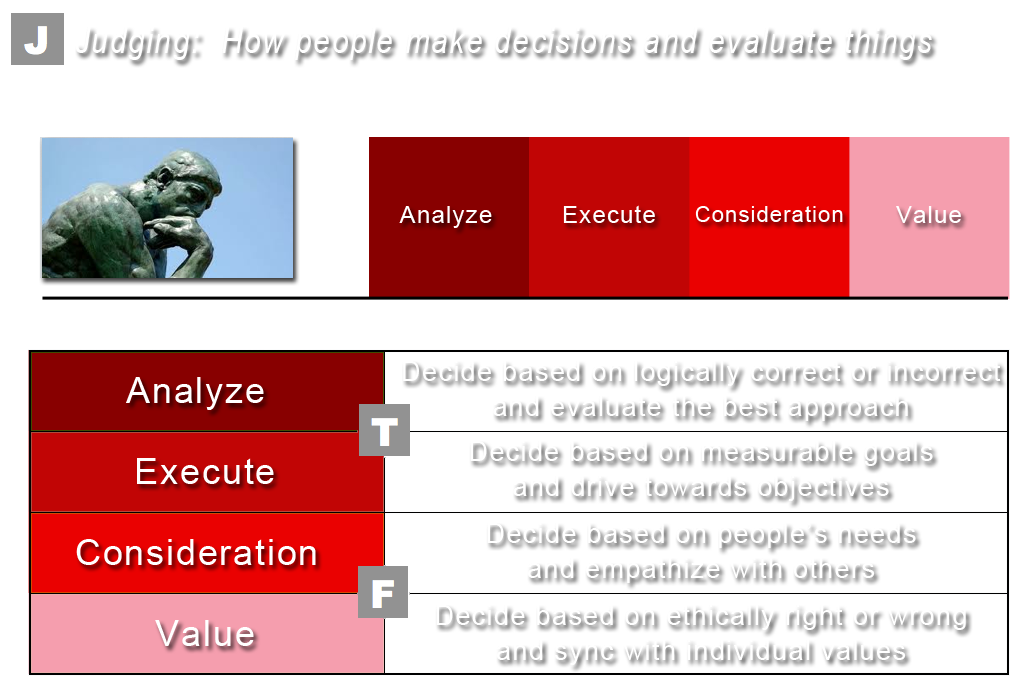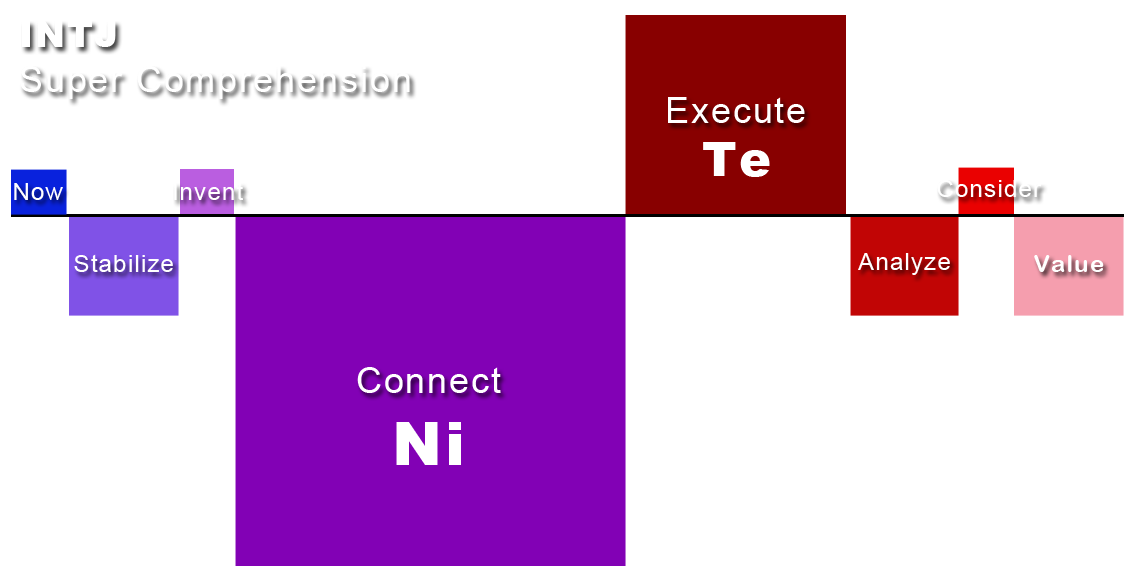

The InnKeeper's Personality Profiles
There are many different personality typing systems available, but they are not all created equal. Some are better than others, although all are limited in scope. I am most familiar with, and have the strongest preference for, the Meyers-Briggs Type Indicator (MBTI), the Kiersey Temperment, and the Smarter About People custom personality profiles, all of which are Jungian-based systems. These systems are fairly complex, and most of what people think they know about them is wrong, including the idea that you can take a simple quiz and it will tell you what your type is. Because they are so complex, I have separated them into multiple pages.
Below are some bits explaining my personality using the Smarter About People Free Profile and Premium Work Report. On the MBTI page is a much more comprehensive look at what MBTI, Kiersey, & Jungian systems look like and how they apply to me. The Smarter About People profile uses the MBTI and Kiersey temperment as its foundation and rearranges the information to something that more closely resembles their Jungian source but using modern language and benefiting from modern research techniques.
- Smarter About People Profile
- MBTI Profile
- Love Languages Profile
- Apology Profile
Smarter About People is a service created by Step Research, a company that works closely the top personality type researchers and has developed their own Visual Type system, a visual model of Carl Jung's Psychological Types showing that each person uses all eight behaviors.
Memorizing the 16 categories in the MBTI can be overwhelming for some people, and the boxed category representation leads to a lot of confusion and misunderstanding of how type systems work. Added to that confusion, people tend to conflate the system with the tool used to determine the category (i.e. the tests and quizzes). This often results in people thinking that each category is a hard box that one either fits into or doesn't, and if the quiz doesn't describe one exactly right, people come away thinking that the system is broken, when that's not how the system works at all. An excellent introduction into the complexity and confusion of type systems can be found in this video, given by Step Research founder Sterling Bates.
The basic gist is that there aren't 16 types, exactly. There kind of are, but that's not how they actually play out in practice. There are more like 8 functions that we either introvert or extrovert. There are 4 functions that we use for gathering information, two of which we do internally and two of which we do externally; and there are 4 functions that we use for making decisions, two of which we do internally and two of which we do externally. People tend to think that each letter in the MBTI system is independent, but in reality they all work together to form a pattern with one function being dominant and another function being secondary. However, we all use all 8 functions and we all have introverted and extroverted tendancies to some degree or another.

©Step Research

©Step Research
This is what personality type looks like in a Visual Type representation. As you can see, all of the categories are present, but people have them in different amounts. It's sort of like handedness - everyone who has two functioning hands uses both of them to some degree or another, but usually one hand is dominant. How dominant, and in what capacity or for what activities, varies even among people who are all in the same category. I might use my right hand with 87% frequency or proficiency, and maybe I use my left hand with 44% frequency or proficiency, so that makes me right handed. But you might notice that those percentages don't add up to 100%, because they are evaluated on their own scale.
The below graphic is a visual representation of what an average INTJ classification looks like (my classification). Any given individual INTJ might have different sized boxes that represents them. What will remain constant is that the Connect box will be their biggest box and the Execute box will be their second biggest box. But how big, and the size of the other boxes, will all vary. And this is for their innate preferences, because everyone is capable of learning the other skills with practice. Just like if you break your dominant hand, you might learn how to write your name with your off-hand. But developing a skill doesn't change what was natural or easy for you to begin with.

©Step Research
I grew up in the classic MBTI system, as explained to me in psychology classes over many years. So I have an easier time understanding, and explaining, the 16 category system. This Visual Type system is newer for me and, although most people find it easier to grasp when they see it, especially if it's being explained by an expert in the system, I find it more difficult to explain to other people. But I completed a Smarter About People profile, and this is how they describe me:
Joreth's Superpower - Super Comprehension
 Joreth experiences a complete and instant understanding of a problem or situation, which is what Super Comprehension is about. Neuroscience shows that for those with this power, it is like they listen and their brain just provides the answer, fully formed. Going to sleep and waking up with the answer is much more common for people with this superpower. Being able to see and understand something from a higher level is natural. Understanding that higher level and how something is connected to what is around it allows Joreth to be amazingly insightful into what long-term results will occur from any action. Joreth's ability to accurately predict the future in the area of their knowledge is unbelievable. Those with this superpower often report having trouble meditating, for it is during the time of quiet meditation that their brain seems to wake up the most and start providing insight. Overdependence on this superpower can especially cause problems for the person in areas where they have little knowledge. At this time their brain responds with either silence or worthless deductions.
Joreth experiences a complete and instant understanding of a problem or situation, which is what Super Comprehension is about. Neuroscience shows that for those with this power, it is like they listen and their brain just provides the answer, fully formed. Going to sleep and waking up with the answer is much more common for people with this superpower. Being able to see and understand something from a higher level is natural. Understanding that higher level and how something is connected to what is around it allows Joreth to be amazingly insightful into what long-term results will occur from any action. Joreth's ability to accurately predict the future in the area of their knowledge is unbelievable. Those with this superpower often report having trouble meditating, for it is during the time of quiet meditation that their brain seems to wake up the most and start providing insight. Overdependence on this superpower can especially cause problems for the person in areas where they have little knowledge. At this time their brain responds with either silence or worthless deductions.
Joreth's Go-To Behaviors
Connect: This is where Joreth starts when interacting with the world. The Primary or Dominant behavior. Joreth uses the process of identifying seemingly disconnected patterns to result in instant insight into a problem or situation. Joreth visualizes her goal or end result, focuses on strategy, synthesizes data almost unconsciously and predicts results with surprising accuracy. Joreth looks to and visualizes the future for answers.
Execute: If the primary behavior is not enough then this is where Joreth goes for answers. Joreth plans, organizes, schedules, measures and structures the decision-making process by directing and interacting with other people. She focuses on measurable goals. Joreth thinks out loud, notices quickly when something is out of sequence or order, sets objectives and criteria for success, and creates step-by-step procedures. Joreth looks to influence and organize the world around her, even when not solicited to do so.
What Makes Joreth and INTJ Distinctive?
Joreth is one of the types that often feels most separated from the rest of humanity and the people around them. She likely tends to have a very complicated and rich view of the world, even very creative, that most people don't see. For almost any system she can envision a very multi-layered approach that often predicts accurately and provides insights that others miss. Joreth is likely energized by long term plans, asking her to create a 10 year plan is a great use of her talents and a task that she will enjoy. Most people see a very calm and collected planner and don't get the chance to see the rich inner life. Joreth is likely to have a private creative hobby. Joreth is probably able to write prolifically as needed with little to no stress.
Communication
INTJ's are very likely to just tell someone the result of their thinking instead of explaining how they got to the answer. Very often they are great with written communication but have greater stress in verbal communication, especially when there is not enough time to consider their words. INTJ's are one of two types that are most likely to say "no" and THEN think about it.
Difficult Conversations
For Joreth, after she has considered the possibilities, she will often come to the conversation with a number of solutions ready. Without the time to internalize them she will not be able to bring her best thinking. Once the conversation is started Joreth may sometimes be very terse and should take extra effort to explain herself.
Setting Goals
Joreth is typically at her best when setting goals. Joreth is likely very good at taking in information from several perspectives, understanding how the situation could play out in the future and integrating that into a higher level strategy. Joreth may sometimes not take the time to explain all the thinking that went into her goals. Joreth may sometimes appear more rigid and resistant than she sees herself.
Getting Feedback
Joreth is likely to be very focused on her own improvement and will welcome advice from those she considers to be expert. It is also likely that Joreth is harder on herself than those she works with. If the feedback is too focused on mundane details or from someone not an expert then it is possible that Joreth will be somewhat dismissive.
When Stressed
Joreth is likely to withdraw into her own world when stressed. She may pull away from social groups or the people she associates with the stress. She may immerse herself in one of her hobbies or activities. She may lash out in anger first and then withdraw without giving other people the chance to find a solution or she may suggest that there is a problem and, when no interest in finding a solution is apparent, may simply move elsewhere to not waste energy on what she might consider to be a "lost cause".
Because Joreth's superpower is the ability to connect many different, sometimes seemingly unrelated, elements and to be able to predict the future using the insight gained from analyzing all those connected elements, she may forsee a problem before it happens. If the problem has not yet occurred, Joreth will probably attempt to warn of the impending problem, but it may come across as being less important than Joreth feels it really is. Because of her private nature and her ability to separate her feelings from her analysis, Joreth's warnings are often misunderstood or dismissed as unimportant or unlikely, and when she feels misunderstood or dismissed, she may simply close down or pull away.
If Joreth seems to be withdrawing, but has not requested to be left alone, a good strategy for dealing with her is to attempt to pull her back out of her shell. Invitations to socialize and to talk are good methods for opening the doors for communication, but being too passive about inviting Joreth or not making specific invitations may result in no invitations being accepted.
Joreth doesn't like to feel imposing, so she may need some coaxing or motivation, such as a planned event, before accepting an invitation. Following through on plans is very important to maintaining trust with Joreth, as is taking her concerns for her future predictions seriously. But if Joreth expresses a desire for being left alone, do not push her. Joreth has a tendency to require "alone time" to recharge and build enough energy for social interactions and she also has a tendency to be somewhat territorial about her personal space, so take care not to encroach on those two things.
Most of the text was taken from Joreth's free personal profile, premium At Work report, and premium Relationship Comparison report, found at the Smarter About People website. Smarter About People is a service that provides free personality profiles, in-depth premium reports on you, and the ability to collect your personality profile scores from other sites in one place in a private account for free, as well as to share those reports and compare yourself with other people.
More About The InnKeeper
The Inn Between © 2002
Contact The InnKeeper